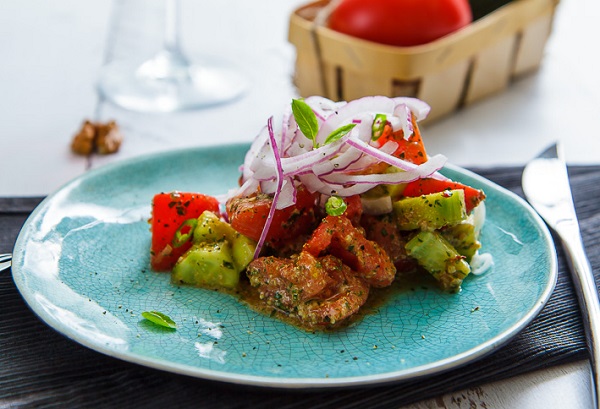
Diet with rheumatism.
With exacerbation.
In the active phase of rheumatism due to compliance with bed rest, the energy value of the diet should be limited. Mainly due to carbohydrates, especially easily digestible. Diet with rheumatism.
Food should be consumed 4-5 times a day. Last meal at least 3-4 hours before bedtime.
Approximate diet menu for patients in the acute phase of the disease:
First breakfast: 2 soft-boiled eggs, porridge porridge, tea with milk.
The second breakfast: an apple baked without sugar.
Lunch: Vegetarian soup without salt, boiled meat with vermicelli, fruit jelly.
Afternoon snack: broth of wild rose.
Dinner: boiled fish, cabbage-carrot chops, tea with milk.
Before going to sleep: kefir.
For the whole day you can eat 100 g of wheat bread. With a tendency to constipation, it is necessary to include in the diet products that promote bowel emptying. These are vegetables, prunes, one-day kefir, yogurt.
Approximate diet menu for patients with rheumatism with a low degree of activity of the rheumatic process:
First breakfast: — 2 soft-boiled eggs, sour-cream with sour cream, tea with milk.
The second breakfast: meat boiled, yeast drink without sugar.
Lunch: Vegetarian cabbage soup, boiled meat with vermicelli, fruit jelly.
Snack: 100 ml yeast drink without sugar.
To prepare the yeast drink you will need: 30 g bread crumbs.
Pour them a glass of hot water. Insist 4 hours, strain. Add 30 grams yeast and 10 g of honey.
Dinner: meatballs, baked in sour cream, with boiled potatoes, lem, cabbage-carrot cutlets fried in vegetable oil.
Before going to sleep: kefir.
For the whole day you can eat 150 g of wheat bread, 100 g of rye bread.
Rules for all.
In the inter-attack period, the diet should be quite full. It is useful to include eggs in the diet. They increase immunity to streptococcal infection. This is due to the inhibitor streptolysin, which is contained in the yolk.
At the same time, it is very important to abandon the refractory fats, which include pork, beef and mutton. Vegetable fats are useful, for example, corn, sunflower, olive, soybean oil.
It is also necessary to limit the consumption of butter. Instead of mayonnaise, season salads with vegetable oil.
Less salt, more vitamins.
At any stage of rheumatism, it is necessary to limit the amount of salt (up to 2-5 g per day). With an excess of salt, sodium and water ions in the tissues are retained. Increase the content in the diet of potassium salts is unacceptable, especially in the presence of circulatory insufficiency.
Degradation of the diet with sodium salts promotes fixation of calcium salts in the tissues, which have an anti-inflammatory effect. Potassium ions contribute to the stamping of sodium and, together with it, fluids from the body. This causes diuretic effect. Also, the accumulation of glycogen in the myocardium is potentiated. Have antiarrhythmic effect.
Enrichment of the diet with potassium and calcium is especially important in the appointment of diuretics and corticosteroid hormones. Inclusion in the diet of foods rich in calcium salts, in addition to anti-inflammatory effect has a desensitizing effect.
This is necessary for the prevention of osteoporosis with prolonged treatment with corticosteroids. Salts of calcium are rich in milk, cottage cheese, yogurt, kefir, cheese.
It is also recommended to enrich the diet with vitamins:
ascorbic acid, bioflavonoids, niacin, riboflavin.
Ascorbic acid, enhancing the synthesis of glycocorticoids and reducing vascular permeability. Has anti-inflammatory effect, participates in the formation of the basic substance of connective tissue. It also improves the effectiveness of cardiac glycoside treatment.
Bioflavonoids compact and reduce the permeability of the walls of blood vessels, especially capillaries. Niacin improves capillary blood flow and stimulates the secretory function of the stomach, which decreases with rheumatism.
Riboflavin promotes the oxidative deamination of a number of amino acids. Improves regeneration. Participates in the regulation of the permeability of the capillary wall.


 Posted in
Posted in  Tags:
Tags: